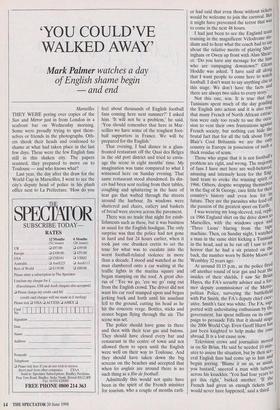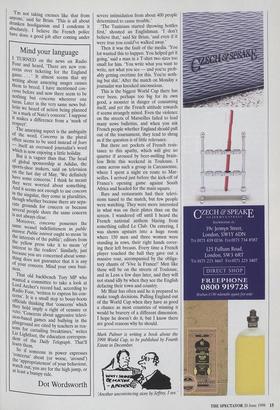`YOU COULD'VE WALKED AWAY'
Mark Palmer watches a day
of English shame begin — and end
Marseilles THEY WERE poring over copies of the Sun and Mirror just in from London in a seafront bar on Wednesday morning. Some were proudly trying to spot them- selves or friends in the photographs. Oth- ers shook their heads and confessed to shame at what had taken place in the last few days. These were the few English fans still in this shaken city. The papers scanned, they prepared to move on to Toulouse — and who knows what?
Last year, the day after the draw for the World Cup in Marseilles, I went to see the city's deputy head of police in his plush office next to La Prefecture. 'How do you feel about thousands of English football fans coming here next summer?' I asked him. 'It will not be a problem,' he said. `You should remember that here in Mar- seilles we have some of the toughest foot- ball supporters in France. We will be prepared for the English.'
That evening, I had dinner in a glass- fronted restaurant off the Quai des Beiges in the old port district and tried to envis- age the scene in eight months' time. My imagination was tame compared to what I witnessed here on Sunday evening. That same restaurant stood abandoned. Its din- ers had been sent reeling from their tables, coughing and spluttering in the haze of tear gas that wafted through the streets around the harbour. Its windows were shattered and chairs, cutlery and baskets of bread were strewn across the pavement.
There was no trade that night for estab- lishments such as these, but it was business as usual for the English hooligan. The only surprise was that the police had not gone in hard and fast 24 hours earlier, when it took just one drunken cretin to set the tone for what was to escalate into the worst football-related violence in more than a decade. I stood and watched as the man clambered onto a car waiting at the traffic lights in the marina square and began stamping on the roof. A great cho- rus of "Ere we go, 'ere we go' rang out from the English crowd. The driver did not want his car roof stamped upon and began jerking back and forth until his assailant fell to the ground, cutting his head as he hit the concrete verge. Bottles, sticks and stones began flying through the air. The scene was set.
The police should have gone in there and then with their tear gas and batons. They should have closed every bar and restaurant in the centre of town and not allowed them to open until the English were well on their way to Toulouse. And they should have taken down the big screens on the beaches and accepted that when les anglais are around there is no such thing as arête de football.
Admittedly this would not quite have been in the spirit of the French minister for tourism, who a couple of months earli- er had said that even those without tickets would be welcome to join the carnival. But it might have prevented the terror that was to come in the next 48 hours.
I had just been to see the England team training in the magnificent Velodrome sta- dium and to hear what the coach had to say about the relative merits of playing Sher- ingham or Owen up front with Alan Shear- er. 'Do you have any message for the fans who are rampaging downtown?' Glenn Hoddle was asked. 'I have said all along that I want people to come here to watch football. I don't want to say anything else at this stage. We don't have the facts and there are always two sides to every story.' Not this one, son. It is true that the Tunisians spent much of the day goading the English into action and it is also true that many French of North African extrac- tion were only too ready to use the occa- sion to vent their own frustrations against French society, but nothing can hide the brutal fact that for all the talk about Tony Blair's Cool Britannia we are the only country in Europe in possession of such a thick residue of scum. Those who argue that it is not football's problem are right, and wrong. The majority of fans I have met here are well-behaved, amusing and intensely keen for the Eng: land team to evoke the winning spirit 0' 1966. Others, despite wrapping themselves in the flag of St George, care little for their country's history and even less for its future. They are the parasites who feed oft the passion of the greatest sport on Earth.. I was wearing my long-sleeved, red, reply- ea 1966 England shirt on the drive down ti), Marseilles, with the windows open and `Three Lions' blaring from the tape machine. Then, on Sunday night, I watched a man in the same shirt kicking a Tunisian in the head, and as he ran off I saw to my horror that he had a six printed on the back, the number worn by Bobby Moore at Wembley 32 years ago. At around 10.15 p.m., as the police fired off another round of tear gas and beat the insides of their shields, I saw Sir Brian Hayes, the FA's security adviser and a for- mer deputy commissioner of the Metro- politan Police, surveying the battlefield with Pat Smith, the FA's deputy chief exec' utive. Smith's face was white. The FA, sup' ported with unhesitating enthusiasm by the government, has spent millions on its cam- paign to persuade Fifa that it should stage the 2006 World Cup. Even Geoff Hurst has just been knighted to help make the case abroad. It is a lost cause now. Television crews and journalists moved in on Sir Brian. He said he needed 10 utes to assess the situation, but by then sev- eral English fans had come up to him and begun jeering. 'Blame it on us, as usual, you bastard,' sneered a man with tattoos across his knuckles. 'You had four years to get this right,' barked another. if the French had given us enough tickets this would never have happened,' said a third. `I'm not taking excuses like that from anyone,' said Sir Brian. 'This is all about drunken hooliganism and I condemn it absolutely. I believe the French police have done a good job after coming under severe intimidation from about 400 people determined to cause trouble.'
`The Tunisians started throwing bottles first,' shouted an Englishman. 'I don't believe that,' said Sir Brian, 'and even if it were true you could've walked away.' Then it was the fault of the media. 'You lot wanted this to happen. You helped get it going,' said a man in a T-shirt two sizes too small for him. 'You write what you want to write, not what you see — and you're prob- ably getting overtime for this. You're noth- ing but shit.' After the match on Monday a journalist was knocked unconscious. This is the biggest World Cup there has ever been, perhaps too big for its own good, a monster in danger of consuming itself, and yet the French attitude towards it seems strangely mixed. Even the violence on the streets of Marseilles failed to lead many news bulletins, and when you ask French people whether England should pull out of the tournament, they tend to shrug as if the question is of little relevance. But there are pockets of French resis- tance to this apathy, which will give no quarter if aroused by beer-swilling brain- less Brits this weekend in Toulouse. I came across such a group in Carcassonne, where I spent a night en route to Mar- seilles. I arrived just before the kick-off of France's opening game against South Africa and headed for the main square.
Bars and restaurants had their televi- sions tuned to the match, but few people were watching. They were more interested in what was on their plates than on the screen. I wandered off until I heard the French national anthem blaring from something called Le Club. On entering, I was shown upstairs into a huge room where 150 men and three women were standing in rows, their right hands cover- ing their left breasts. Every time a French player touched the ball they gave out a massive roar, accompanied by the obliga- tory chants of Wive la France!' Men like these will be on the streets of Toulouse, and in Lens a few days later, and they will not stand idly by when they see the English defacing their town and country. Mr Blair has often said he is prepared to make tough decisions. Pulling England out of the World Cup when they have as good a chance as most countries of winning it would be bravery of a different dimension. I hope he doesn't do it, but I know there are good reasons why he should.
Mark Palmer is writing a book about the 1998 World Cup, to be published by Fourth Estate in December.
Another unconvincing story by Jeffrey, I see.'



























































 Previous page
Previous page